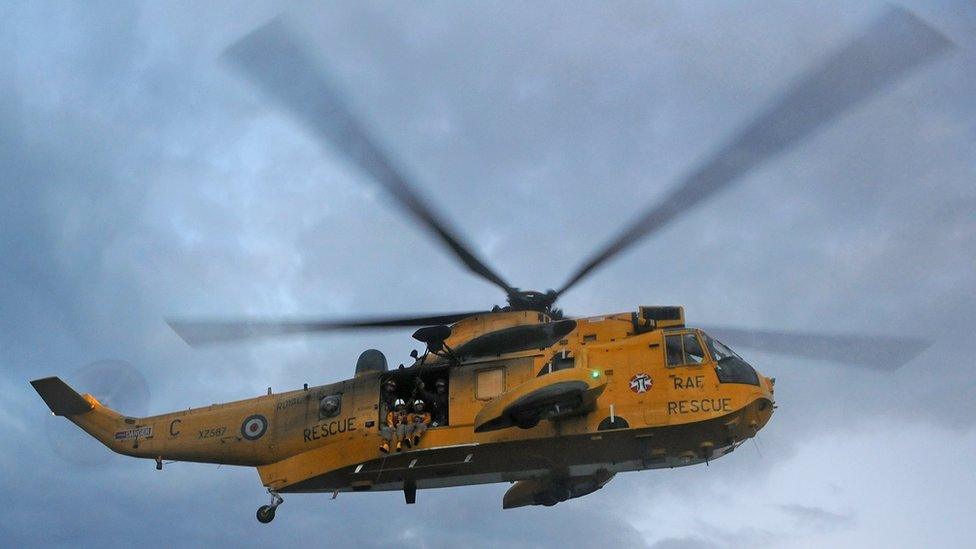Royal Marines to fight MoD in court in asbestos claim
- Published
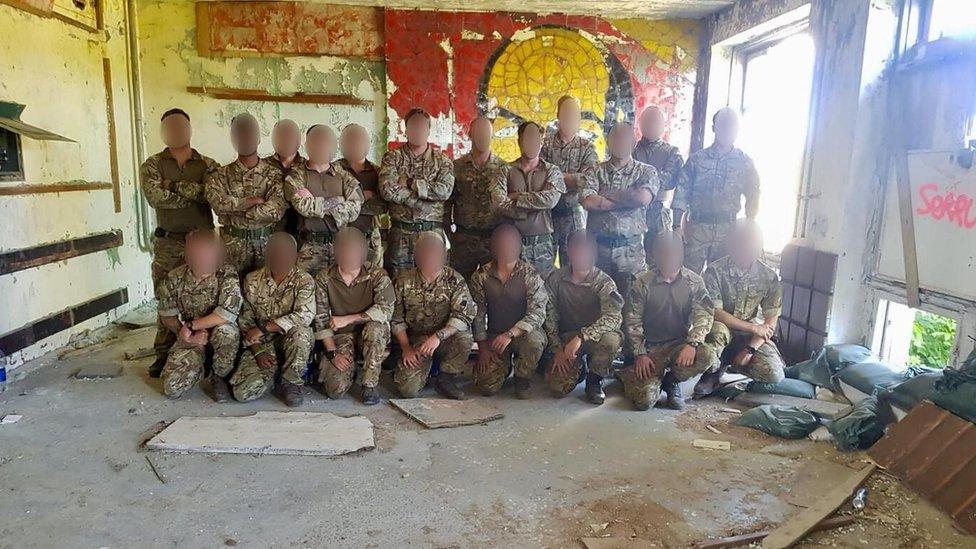
The case came after two military exercises in Latvia in 2018 and 2019 at an abandoned former Soviet town called Skrunda-1 (pictured inside one of the buildings)
A group of 260 Royal Marines have issued proceedings against the Ministry of Defence (MoD) amid claims they were "knowingly" exposed to asbestos.
The potential exposure is said to have taken place in Latvia in 2018 and 2019 over two exercises, with a sample from the site allegedly containing asbestos.
It is claimed the MoD breached the Human Rights Act by "knowingly" exposing them to the substance.
The MoD said it took troops' health and safety "extremely seriously".
It had previously conducted a Service Inquiry into what it called "alleged exposure" during exercises Saber Strike 18 (SS18) and Baltic Protector 19 (BP19) but could not comment further due to ongoing legal proceedings.
The case is being brought to the High Court by 260 service personnel from Plymouth's 30 Commando and Arbroath's 45 Commando, mostly Royal Marines with attached soldiers from the Army. Of those, only 38 remain in service.
Proceedings were issued on 6 February seeking compensation for breaches of the Human Rights Act and trespass to the person.
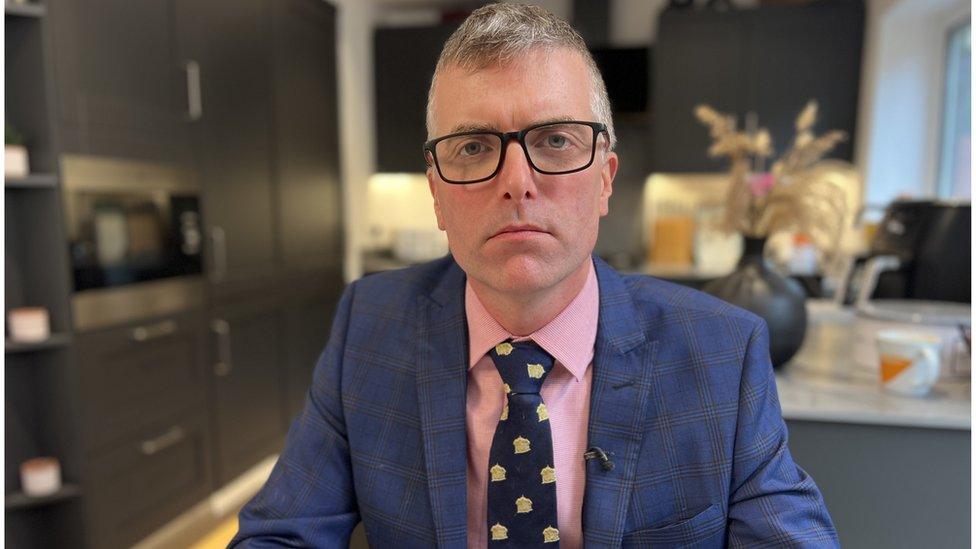
Ed Hill claimed he collected a sample of dust from the site in Latvia which he took for testing in an Exeter laboratory where it was found to allegedly contain asbestos
The claim came after former Royal Marine Edward Hill, who was on BP19 with Plymouth's 30 Commando, expressed concern over the dust in a disused building they were being asked to sleep in at the base called Skrunda-1.
He asked a superior if the group could sleep outside in a tent instead but was refused due to safety concerns and was later told to lay down boards to stop the dust from being disturbed.
Mr Hill then took it upon himself to collect a 2kg (4lb) sample from the abandoned former Soviet town.
It is claimed that tests later showed the sample contained Chrysotile fibre, a white loose asbestos usually found in pipe insulation or corrugated roofs.
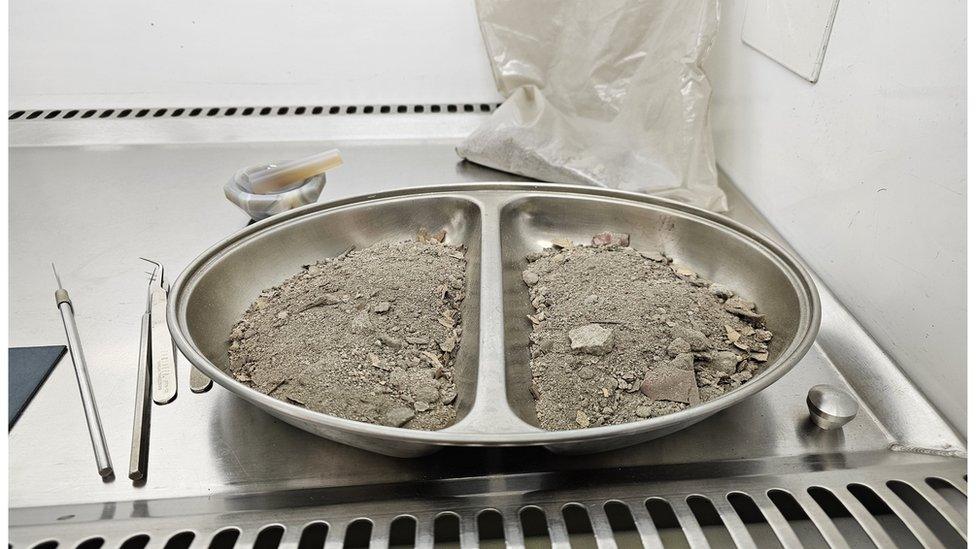
Some of the dust from the sample Mr Hill provided to Environmental Services, in Exeter, which contained Chrysotile fibre
Mr Hill said: "One person had told us the dust might contain asbestos but at the same time it was safe enough to sleep in and another person telling us not to worry because the asbestos had been removed.
"I just wanted to know.
"We could shake our hair and see the dust fall out, it covered absolutely everything."
Asbestos is only considered dangerous when it is disturbed or damaged.
Inhaling microscopic asbestos fibres can cause cancers such as mesothelioma and lung cancer, and other serious lung diseases.
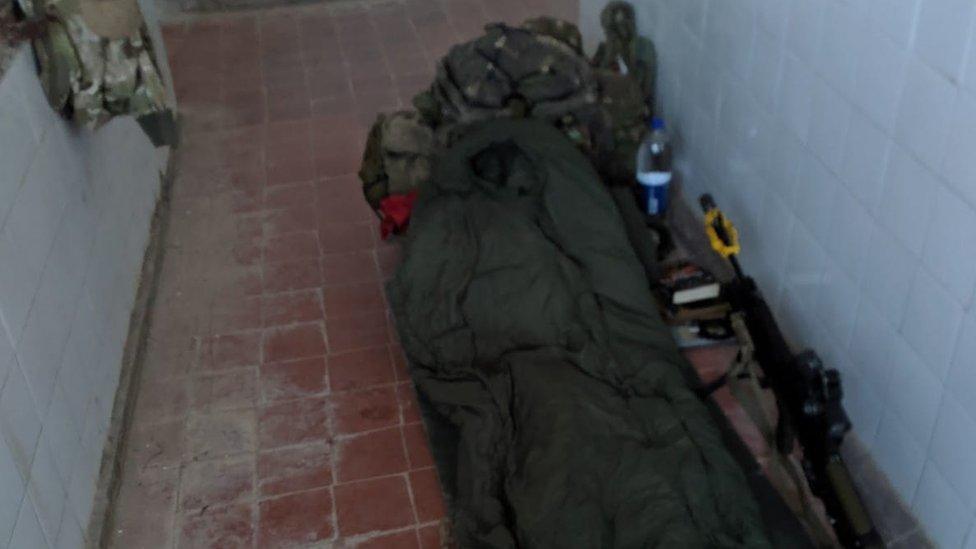
Marines described dust in their hair, clothing and sleeping bags
It was claimed that the MoD knew asbestos was present at Skrunda-1 prior to both exercises but troops were not briefed accordingly.
A report dated 4 June 2018, as SS18 in Skrunda-1 began, identified the presence of asbestos at the site.
A second military plan from April 2019 also stated, in bold, that asbestos was in the buildings - 12 weeks before BP19 arrived.
Mr Hill, who served for 15 years in the Royal Marines, added: "I was angry because the MoD knew the asbestos was there. I wanted somebody to be held accountable."
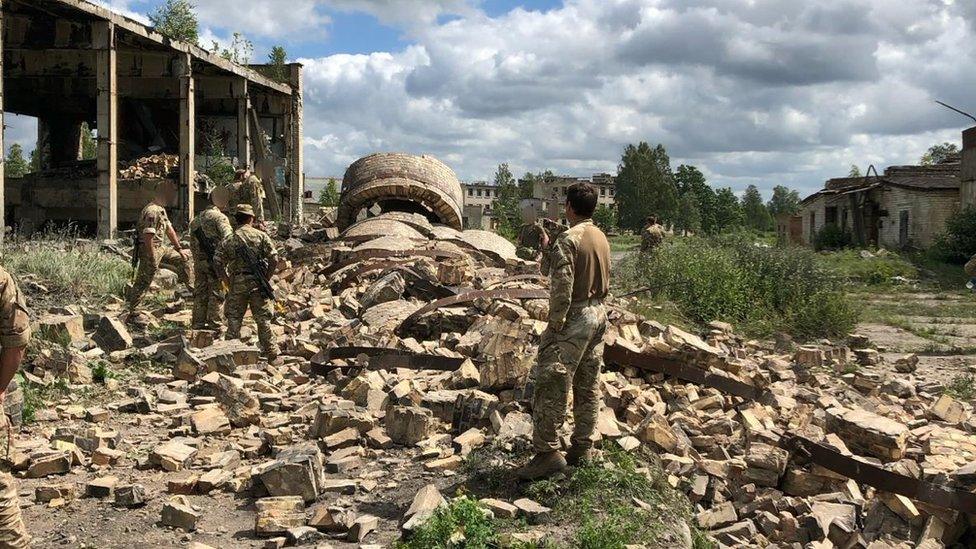
The tower which was blown up by explosives teams of the Royal Marines
One marine from 45 Commando, who asked not to be named, described knocking down rafters to fill sandbags with the dust and rubble.
He said he found out about the case some months later.
"It took a year to be able to tell my wife," he said.
"When she was pregnant the only thing I could think of was that I might not be able to live to see my child to the age I am now.
"It's brought a lot of emotions. I try not to think about it because you just end up in a sad spiral."
Former marine Ross Forbes, from Arbroath's 45 Commando, said he and colleagues "held their breath" during explosive entries.
He said after his daughter was born he felt "an anxiety" about the potential for him having a fatal illness in the future.
"We all signed on the dotted line to serve and be sent anywhere but we didn't sign up to be hit with a condition when we were 50 because of negligence whilst on a training exercise," he said.
A number of the marines told the BBC that after the exercise they returned to their homes and families with what they believe now was contaminated clothing and equipment.
They say they were told in September 2019 by command to wash any kit used in Skrunda-1, weeks after returning to the UK that July.
A MoD spokesperson said: "We take the health and safety of our service personnel and their families extremely seriously.
"We cannot comment on specific allegations which are the subject of legal claims."
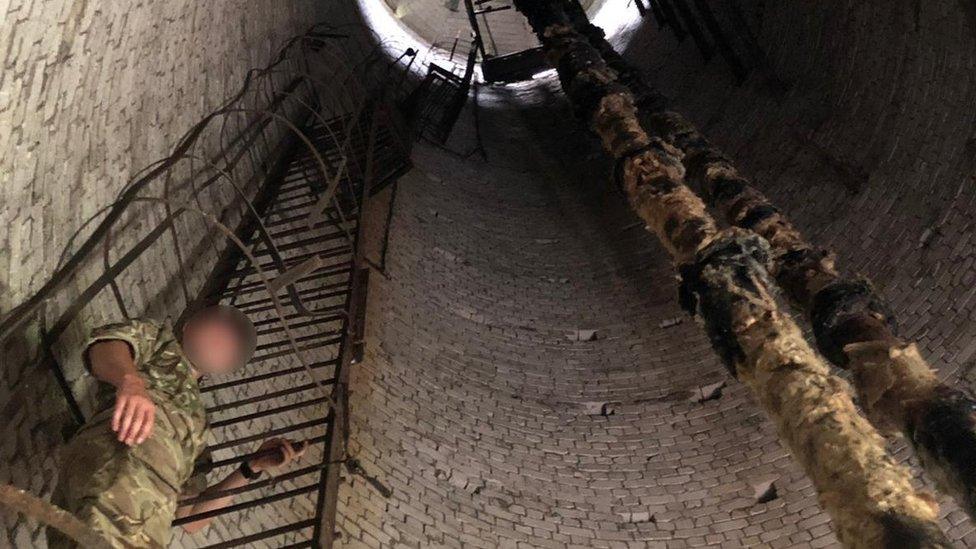
One of the commandos inside a water tower
Mr Hill has since been gathering further evidence including a colour-coded map supplied by the host nation in the planning phase of BP19 and not seen until after by the group of Royal Marines.
According to reports in the Service Inquiry, a member of the Royal Marines was verbally told red-marked buildings contained asbestos and green buildings were said to have had the asbestos removed, although no confirmation of the remedial work was seen by the Royal Marines.
A video shared with the BBC showed commandos blowing up what they claimed was a red-marked tower, under orders from command.
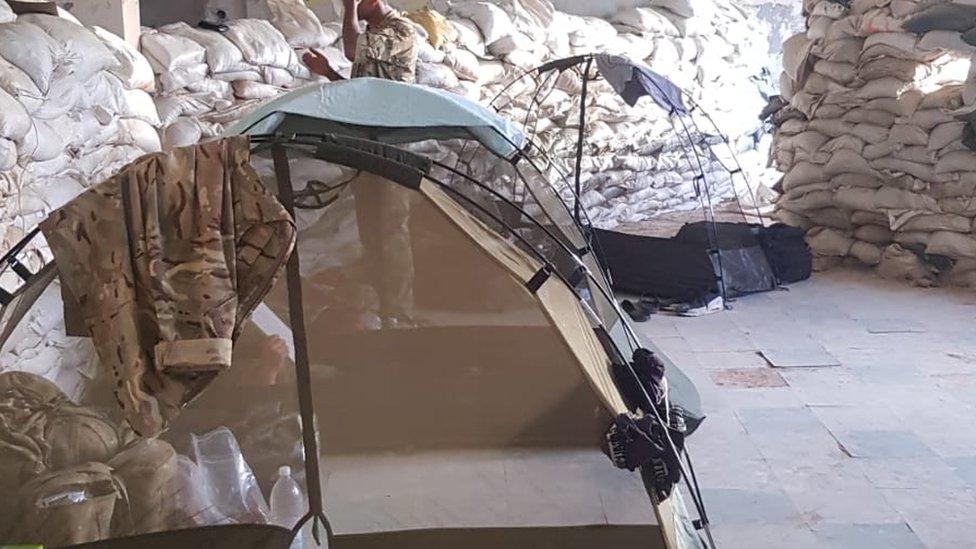
Dust visible on the floor around a sleeping area
The BBC has seen requests dating back to 2020 for the MoD to disclose documents relating to the case, which had not been released by January 2024.
Lawyers acting for Mr Hill and the group said the situation was "borderline scandalous".
Terrence Donovan, of Kinglsey Napley, said: "If that was a building company in the UK they would be in breach of health and safety."
The group behind the claim also said the Service Inquiry was "not fit for purpose" because it did not test Mr Hill's sample or arrange for samples to be collected from Skrunda-1 by MoD experts to verify the claims.
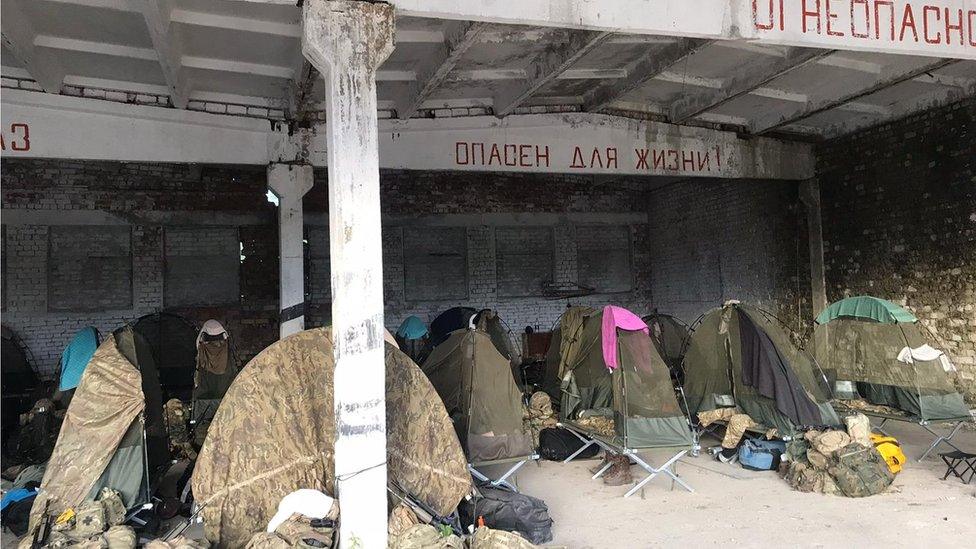
The writing on the back beam of an accommodation area translates to "dangerous to life"
The group said it had requested medical monitoring, which the MoD has not agreed to.
They also said they asked that 70 unidentified personnel who were in Skrunda-1 be informed of the possible exposure. They claim the MoD rejected the request.
Father-of-one Bradley Robertson, who was with Plymouth's 30 Commando in Skrunda-1, said he wanted to see someone held accountable.
"It's massively unfair," he said.
"Someone could have potentially handed me an unnecessary death sentence."
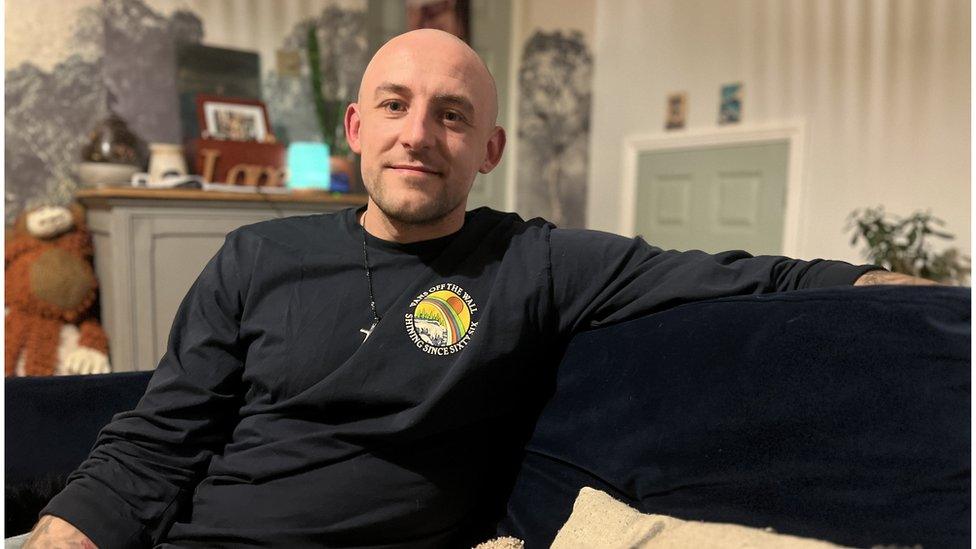
Bradley Robertson said he was "glad" he was no longer in the military because of the Skrunda-1 case
Mr Robertson was one of nine servicemen who told the BBC the potential exposure on BP19 impacted their decision to leave the armed forces.
It came at a time the British military faced recruitment and retention challenges.
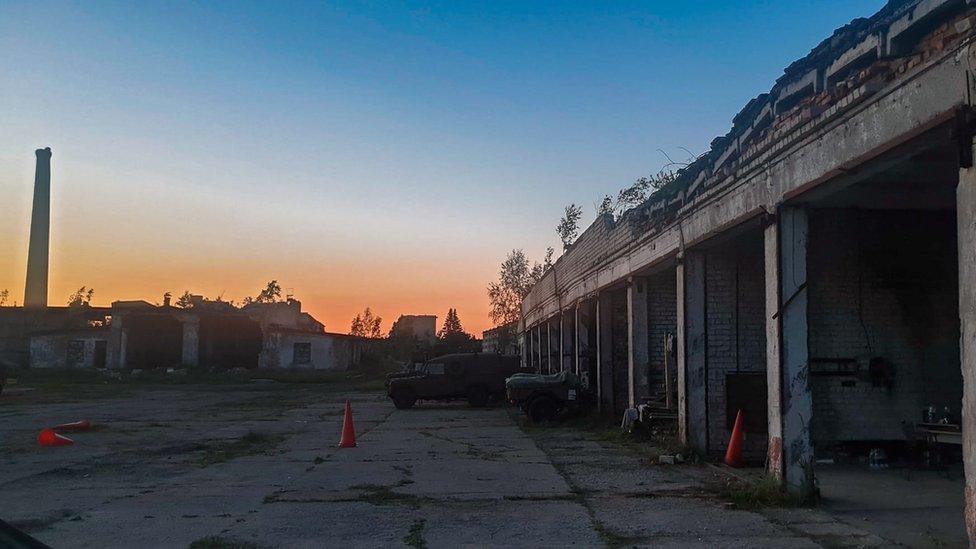
An abandoned garage where about 20 Royal Marines set up camp
The BBC understands the remaining red-marked buildings at Skrunda-1 have since been demolished.
Crown immunity
Crown immunity protects the MoD and other central government departments from prosecution - something the group is petitioning to be removed from the MoD in training situations like this.
Hilary Meredith-Beckham, a lawyer who has represented members of the armed forces for 37 years, said during her career there had only been four times where she believed the MoD should be prosecuted for breaching a duty of care to its people and this case was "without a doubt" one of them.
"If they [MoD] house you and ask you to sleep and be fed in a disused building with asbestos-lined dust landing on the floor, then without a doubt that duty of care is owed and has been breached," she said.
Mrs Meredith-Beckham has previously been a witness on Defence Select Committees discussing removing Crown immunity from the MoD during training.
MP Ben Bradshaw has also written to the Defence Select Committee asking for it to consider its own inquiry.

Follow BBC Devon on X (formerly Twitter), external, Facebook, external and Instagram, external. Send your investigation ideas to southwestinvestigationsteam@bbc.co.uk, external.
- Published26 August 2018
